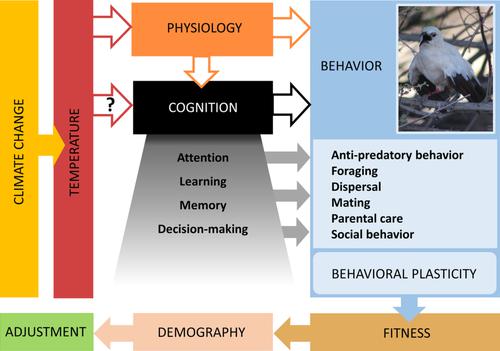当前位置:
X-MOL 学术
›
WIREs Clim. Chang.
›
论文详情
Our official English website, www.x-mol.net, welcomes your
feedback! (Note: you will need to create a separate account there.)
The impacts of heat stress on animal cognition: Implications for adaptation to a changing climate
WIREs Climate Change ( IF 9.4 ) Pub Date : 2021-04-27 , DOI: 10.1002/wcc.713 Camilla Soravia 1 , Benjamin J. Ashton 1, 2 , Alex Thornton 3 , Amanda R. Ridley 1
WIREs Climate Change ( IF 9.4 ) Pub Date : 2021-04-27 , DOI: 10.1002/wcc.713 Camilla Soravia 1 , Benjamin J. Ashton 1, 2 , Alex Thornton 3 , Amanda R. Ridley 1
Affiliation

|
With global surface air temperature rising rapidly, extensive research effort has been dedicated to assessing the consequences of this change for wildlife. While impacts on the phenology, distribution, and demography of wild animal populations are well documented, the impact of increasing temperature on cognition in these populations has received relatively little attention. Cognition encompasses the mental mechanisms that allow individuals to process information from the surrounding environment, respond accordingly, and flexibly adjust behavior. Hence, it is likely to be a key factor in allowing animals to adjust adaptively to climate change. Captive studies show that heat stress can negatively affect cognitive performance not only in the short-term but also in the long-term, by altering cognitive development at early life stages. Field studies indicate that cognitive performance may affect survival and reproductive success. However, the link between heat stress, cognition, and fitness in wild animals has yet to be formally established. We propose a comprehensive research framework for the collection of robust empirical datasets on heat stress and cognitive performance in the wild. We then suggest how knowledge of heat stress impacts on cognitive performance could be applied to population viability models and wildlife management actions. We believe that a joint research effort encompassing the fields of thermal physiology, behavioral ecology, comparative cognition, and conservation science, is essential to provide timely mitigation measures against the potential impacts of climate change on wildlife.
中文翻译:

热应激对动物认知的影响:对适应气候变化的影响
随着全球地表气温迅速上升,广泛的研究工作致力于评估这种变化对野生动物的影响。虽然对野生动物种群的物候、分布和人口统计学的影响已有详细记录,但温度升高对这些种群认知的影响却很少受到关注。认知包括允许个人处理来自周围环境的信息、做出相应反应并灵活调整行为的心理机制。因此,它可能是让动物适应气候变化的关键因素。圈养研究表明,热应激不仅会在短期内而且在长期内,通过改变生命早期阶段的认知发展,都会对认知能力产生负面影响。实地研究表明,认知能力可能会影响生存和繁殖成功。然而,野生动物的热应激、认知和健康之间的联系尚未正式确定。我们提出了一个全面的研究框架,用于收集关于野外热应激和认知表现的可靠经验数据集。然后,我们建议如何将热应激影响认知能力的知识应用于种群生存力模型和野生动物管理行动。我们相信,一项涵盖热生理学、行为生态学、比较认知和保护科学领域的联合研究工作对于及时缓解气候变化对野生动物的潜在影响至关重要。
更新日期:2021-06-10
中文翻译:

热应激对动物认知的影响:对适应气候变化的影响
随着全球地表气温迅速上升,广泛的研究工作致力于评估这种变化对野生动物的影响。虽然对野生动物种群的物候、分布和人口统计学的影响已有详细记录,但温度升高对这些种群认知的影响却很少受到关注。认知包括允许个人处理来自周围环境的信息、做出相应反应并灵活调整行为的心理机制。因此,它可能是让动物适应气候变化的关键因素。圈养研究表明,热应激不仅会在短期内而且在长期内,通过改变生命早期阶段的认知发展,都会对认知能力产生负面影响。实地研究表明,认知能力可能会影响生存和繁殖成功。然而,野生动物的热应激、认知和健康之间的联系尚未正式确定。我们提出了一个全面的研究框架,用于收集关于野外热应激和认知表现的可靠经验数据集。然后,我们建议如何将热应激影响认知能力的知识应用于种群生存力模型和野生动物管理行动。我们相信,一项涵盖热生理学、行为生态学、比较认知和保护科学领域的联合研究工作对于及时缓解气候变化对野生动物的潜在影响至关重要。











































 京公网安备 11010802027423号
京公网安备 11010802027423号